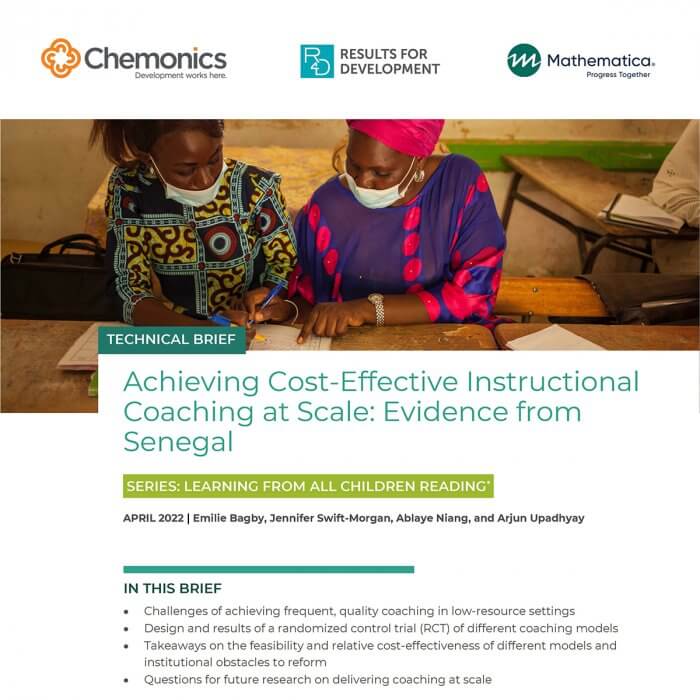WASHINGTON, D.C. — Results for Development (R4D), Mathematica and Chemonics International recently published a technical brief, which shares evidence from Senegal about models for delivering instructional coaching for teachers — an important intervention to support teachers improve classroom instruction and student learning outcomes.
The technical brief is a product of USAID-funded activities, Lecture Pour Tous, implemented by Chemonics, and the Rapid Feedback Monitoring, Evaluation, Research, and Learning (RF MERL) consortium, which includes R4D, Mathematica, Abt Associates, and the Pulte Institute for Global Development at the University of Notre Dame. The brief was developed as a global public good to enrich the literature on teacher coaching practices. It can be used by governments, researchers, academics, funders, and program implementers
Senegal has worked to dramatically increase student reading outcomes in the earliest grades through its Lecture Pour Tous (“reading for all”) program, supported by USAID and led by Chemonics. Under Lecture Pour Tous, specialists and key decision-makers in the Ministry of National Education introduced a coaching model using ministry school directors and inspectors to coach teachers on new techniques and tools. However, the program struggled to improve teacher practice.
To course correct, Chemonics partnered with the RF MERL to lead a mixed-methods investigation of causes for lack of success and potential solutions. This included an RCT of three coaching modalities, including Lecture Pour Tous’ original coaching model, tele-coaching and supplemental in-person coaching. RF MERL and Chemonics also led lean testing of the experimental coaching models to make any rapid adjustments before the experiment began in earnest.
This engagement aimed to identify ways to increase and improve instructional coaching as a key component of teacher support — seeking a model that could be scaled nationally and sustained at least over the reform period.
“Quality classroom instruction is one of the most critical system components needed for learning,” said Arjun Upadhyay, a senior program officerat R4D. And teacher coaching is one of the best ways to improve instruction. The more evidence we have about what type of coaching works and what does not, the better.”
The technical brief, “Achieving Cost-Effective Instructional Coaching at Scale: Evidence from Senegal,” unpacks this process and includes an evidence review and results from an RCT of instructional coaching models. Key findings include:
- Overall, teachers reported largely positive effects of coaching under Lecture Pour Tous, and the new models provided added value.
- The two new models, whether with supplemental coaching in-person or by telephone, appeared to improve teacher practice more than the base model.
- In some cases, teachers with supplemental in-person coaching demonstrated better instructional practices than teachers with tele-coaching.
It also includes takeaways on the feasibility and relative cost-effectiveness of different models and institutional obstacles to reform, and questions for future research on delivering coaching at scale.
###
About RF MERL
Rapid Feedback Monitoring, Evaluation, Research, and Learning (RF MERL) provides timely evidence and feedback to guide decision-making and adaptation of programs funded by USAID. RF MERL is supported by the USAID Bureau for Policy, Planning and Learning and is implemented by a consortium of four organizations: Results for Development Institute (R4D), Mathematica, Abt Associates, and the Pulte Institute for Global Development at the University of Notre Dame.
About Chemonics
About Chemonics: Founded in 1975, Chemonics is a 100% employee-owned international development consulting firm. In more than 70 countries around the globe, our network of approximately 5,000 specialists shares a simple belief: that the challenges we face today are best solved through the right partnerships — sharing knowledge, expertise, and experience to deliver results. Where Chemonics works, development works. Follow us on Facebook and Twitter or visit us at www.chemonics.com.
About Results for Development
Results for Development (R4D) is a leading non-profit global development partner. We collaborate with change agents — government officials, civil society leaders, and social innovators — supporting them as they navigate complex change processes to achieve large-scale, equitable outcomes in health, education, and nutrition. We work with country leaders to diagnose challenges, co-create, innovate and implement solutions built on evidence and diverse stakeholder input, and engage in learning to adapt, iterate and improve. We also strengthen global, regional and country ecosystems to support country leaders with expertise, evidence, and innovations. R4D helps country leaders solve their immediate challenges today, while also strengthening systems and institutions to address tomorrow’s challenges. And we share what we learn so others around the world can achieve results for development too. www.R4D.org














